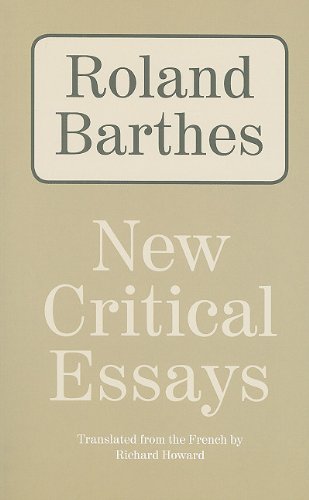Finding the best roland barthes essays suitable for your needs isnt easy. With hundreds of choices can distract you. Knowing whats bad and whats good can be something of a minefield. In this article, weve done the hard work for you.
Reviews
1. Mythologies: The Complete Edition, in a New Translation
Feature
Mythologies The Complete Edition in a New TranslationDescription
"No denunciation without its proper instrument of close analysis," Roland Barthes wrote in his preface to Mythologies. There is no more proper instrument of analysis of our contemporary myths than this bookone of the most significant works in French theory, and one that has transformed the way readers and philosophers view the world around them.
Our age is a triumph of codification. We own devices that bring the world to the command of our fingertips. We have access to boundless information and prodigious quantities of stuff. We decide to like or not, to believe or not, to buy or not. We pick and choose. We think we are free. Yet all around us, in pop culture, politics, mainstream media, and advertising, there are codes and symbols that govern our choices. They are the fabrications of consumer society. They express myths of success, well-being, or happiness. As Barthes sees it, these myths must be carefully deciphered, and debunked.
What Barthes discerned in mass media, the fashion of plastic, and the politics of postcolonial France applies with equal force to today's social networks, the iPhone, and the images of 9/11. This new edition of Mythologies, complete and beautifully rendered by the Pulitzer Prizewinning poet, critic, and translator Richard Howard, is a consecration of Barthes's classica lesson in clairvoyance that is more relevant now than ever.
2. Mythologies
Description
3. Incidents (The French List)
Description
French philosopher and literary theorist Roland Barthes was one of the leading influences on the post-structuralist movement in twentieth-century literary thought, and some of his best-known works, like S/Z, speak directly to the essential and individual relationship between a reader and a literary text. In Incidents, readers have the privilege of going inside the life and thought of Barthes, through a book that is a testament to Barthes belief that a literary work should invite the full, active participation of the reader.
The essays collected in Incidents, originally published in French shortly after Barthes death, provide unique insight into the authors life, his personal struggles, and his delights. Though Barthes questioned the act of keeping a journal with the aim of having it published, he decided to undertake a diary-like experiment in four parts. The first, which gives the collection its title, is a revealing personal account of his time living in Morocco. The second, The Light of the Southwest, is an ode to Barthes favorite region in France, while in At Le Palace Tonight, Barthes describes a vibrant Paris night spot. Finally, the journal entries of Evenings in Paris reveal Barthes as an older gay man, struggling with his desire for young lovers.
Rendered here in a lyrical new translation alongside the striking photographs of Bishan Samaddar, Incidents will delight fans of Barthes other works, as well as anyone curious for a look inside the mind of one of the twentieth centurys foremost intellectuals.
4. Roland Barthes by Roland Barthes
Feature
Hill WangDescription
First published in 1977, Roland Barthes by Roland Barthes is the great literary theorist's most original worka brilliant and playful text, gracefully combining the personal and the theoretical to reveal Roland Barthes's tastes, his childhood, his education, his passions and regrets.
5. Camera Lucida: Reflections on Photography
Feature
Hill WangDescription
A graceful, contemplative volume, Camera Lucida was first published in 1979. Commenting on artists such as Avedon, Clifford, Mapplethorpe, and Nadar, Roland Barthes presents photography as being outside the codes of language or culture, acting on the body as much as on the mind, and rendering death and loss more acutely than any other medium. This groundbreaking approach established Camera Lucida as one of the most important books of theory on the subject, along with Susan Sontag's On Photography.
6. S/Z: An Essay
Feature
S Z An EssayDescription
Preface by Richard Howard. Translated by Richard Miller. This is Barthes's scrupulous literary analysis of Balzac's short story "Sarrasine."
7. Signs and Images. Writings on Art, Cinema and Photography: Essays and Interviews, Volume 4 (The French List)
Feature
Signs and Images Writings on Art Cinema and Photography Essays and Interviews Volume 4Description
Signs and Images gathers pieces related to Barthes central concerns: semiotics, visual culture, art, cinema, and photography. It is a rare compilation of his articles on film criticism and reviews on art exhibitions. The volume features essays on Marthe Arnould, Lucien Clergue, Daniel Boudinet, Richard Avedon, Bernard Faucon, and many more.
Taken together, the five volumes in this series are a gift to Barthes many fans, helping to round out our understanding of this restless, protean thinker and his legacy.
8. New Critical Essays
Feature
Used Book in Good ConditionDescription
9. The Responsibility of Forms: Critical Essays on Music, Art, and Representation
Description
10. The Responsibility of Forms: Critical Essays on Music, Art, and Representation by Roland Barthes (1991-02-07)









